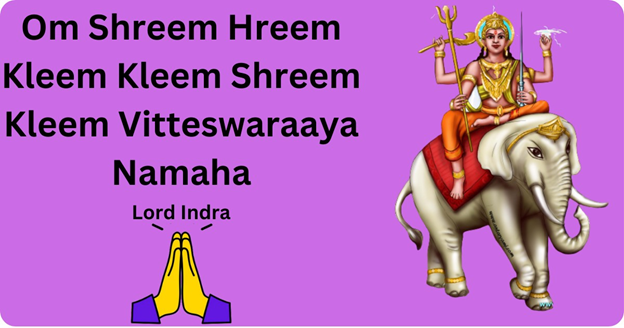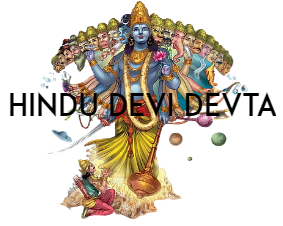Lord Indra
A prominent deity in Hindu mythology is Lord Indra, and he is regarded as the king of the gods, presiding over the heavens and the celestial realms. He is frequently portrayed as a youthful and handsome god, mounted on a white elephant named Airavata and wielding a thunderbolt recognized as Vajra.
A significant role in Hindu cosmology is held by Indra, as the leader of the Devas, the divine beings linked with diverse facets of the universe. Rain, thunderstorms, and the governance of celestial bodies are aspects associated with him. It is believed that the weather, especially the monsoons essential for agricultural prosperity, is controlled by Indra.
Story of Lord Indra about his birth
The intriguing tale of Lord Indra’s birth is found in Hindu mythology. It is initiated with the creation of the universe and the emergence of diverse deities. According to the scriptures, the birth of Lord Indra was attributed to Lord Brahma, the creator of the universe.
In the early stages of creation, the establishment of order and harmony in the cosmos was sought by Lord Brahma. The realization of the necessity for a powerful deity to govern the celestial realms and uphold balance among the gods was reached. Consequently, a decision was made by him to bring forth a supreme being who would be designated as the king of the Devas (gods) and would assume the role of the ruler of the heavens.
To accomplish this purpose, a grand Yajna (sacrificial ritual) known as the Ashwamedha Yajna was performed by Lord Brahma. As a component of the Yajna, the divine energies were invoked, and potent mantras were intoned. The energy that was emitted from the Yajna ultimately underwent a transformation, giving rise to a resplendent and majestic form, which took on the manifestation of Lord Indra.
As a divine being, Lord Indra came into existence adorned with regal attributes and wielding celestial weapons. Remarkable strength, intelligence, and leadership qualities were possessed by him, rendering him well-suited for the fulfillment of the role of the king of the gods.
Upon his birth, the position of the leader of the Devas and the guardian of the heavens was assumed by Lord Indra. Responsibility for the maintenance of order, the protection of the gods, and the upholding of the cosmic balance was taken up by him. Essential aspects such as rainfall, thunderstorms, and the regulation of celestial phenomena were also placed under the charge of Lord Indra.
The story of Lord Indra’s birth does not find its conclusion there. The position of the king of the gods encountered numerous challenges, particularly from the formidable demons who aimed to disturb cosmic harmony. These powerful beings, who posed a threat to the gods and the universe as a whole, were confronted.
One notable tale involving Lord Indra is the battle with the demon Vritra. Vritra, a fearsome and mighty demon, found himself endowed with immense strength and was able to seize the waters of the earth. This action led to a severe drought, resulting in suffering and hardship among living beings.
Upon the witnessing of the world’s plight, a determination to defeat Vritra and restore the waters was ignited within Lord Indra. A fierce battle with the demon was entered into by him, utilizing his celestial weapon, the thunderbolt or Vajra. Following an arduous struggle, a decisive blow was administered by Lord Indra, resulting in the vanquishment of Vritra and the liberation of the waters. This victory ushered in relief and prosperity to the world.
The story of Lord Indra’s birth and the triumphs achieved over demons subsequently highlight his portrayal as a potent and benevolent deity. Leadership, courage, and the capacity to conquer challenges are symbolized by him. Lord Indra’s role, legends, and deeds have been honored in diverse Hindu scriptures and epics, including the Rigveda, the Mahabharata, and the Puranas.
Despite being the king of the gods, Lord Indra is not devoid of flaws. He is portrayed as a deity who, on occasion, falls prey to arrogance and pride. These imperfections act as a reminder of the intricacies and susceptibilities of divine beings and their interactions with the mortal realm.
In Hindu religious practices, Lord Indra is held in reverence and worshipped. Blessings for prosperity, protection, and success are sought by devotees from him. Festivals such as Indra Puja, celebrated in certain regions of India, are dedicated to the honor and the offering of prayers to Lord Indra.
The story of Lord Indra’s birth brings into focus his crucial role as the leader of the gods and the guardian of cosmic order. Tales of valor and triumph related to him act as a source of inspiration for devotees, underscoring the significance of strength, righteousness, and the maintenance of harmony in the universe.

Why is Lord Indra not Worshipped
1) Indradev, the king of Gods in Hinduism, is not worshipped due to ancient stories.
- Indradev is also known as Devraj.
- In Hindu scriptures, stories exist that explain why Indradev is not worshipped.
- No temple of Indradev can be found in India.
2) Indra Dev is not worshipped because he was a title given to whoever achieved the throne of heaven.
- He was afraid of losing his throne and did not allow anyone to become more powerful than him.
- He would attract ascetics with his sorcerers and ruin their paths.
3) Lord Indra is mesmerized by Ahilya’s beauty
- Ahilya’s beauty captivates Lord Indra
- Lord Indra is infatuated with Ahilya
4) Indra’s deceitful plan to seduce Ahilya
- Indra disguises himself as Rishi Gautam to approach Ahilya
- Ahilya serves Indra, unaware of his true identity
- Gautam Rishi discovers the imposter and becomes angry
5) Sage Gautam curses Indra and turns Ahilya into stone
- Indra cursed to have 1000 yonis come out of his body and be equal to other gods
- Ahilya cursed to become a stone and be lifted by Lord Vishnu Ram in Treta Yug
6) Lord Krishna encourages the Brajwasi to stop worshipping Lord Indra and instead worship a cow and Govardhan Mountain
- In the second era, Lord Vishnu in Ram avatar blesses those who touch his feet
- In the past, Lord Krishna observed the Brajwasi worshipping Indra, who he deemed unworthy of worship
7) Shri Krishna challenges the worshipping of Indra and protects the Brajwasi from heavy rain by using Govardhan Mountain
- Shri Krishna proposes the celebration of Gopotsav instead of Indrotsav
- Indra attempts to punish Brajwasi with heavy rain, but Shri Krishna saves them by sheltering them under Govardhan Mountain
8) Lord Krishna fought with Indra and Indra lost, leading to the celebration of Govardhan Parva.
- The temple is made of deities who are worshipped, but if Devraj Indra cannot be worshipped, then how can his temple be made?

Can you be more specific about the content of your article? After reading it, I still have some doubts. Hope you can help me.
you can join me on discord, Discord Username: vishal_020387
You can visit my websites,
https://intellectaiworld.com/
https://vishalversatile.com/
https://hindudevidevta.com/
you can join me on discord, Discord Username: vishal_020387
You can visit my websites,
https://intellectaiworld.com/
https://vishalversatile.com/
https://hindudevidevta.com/